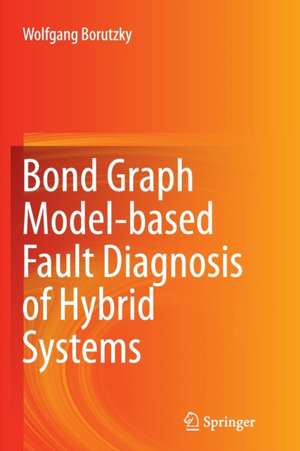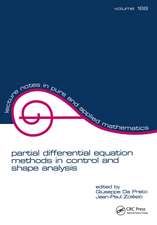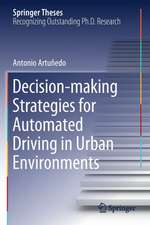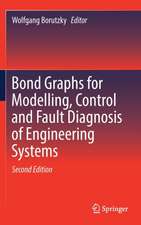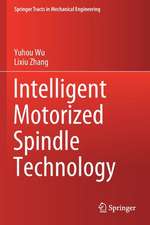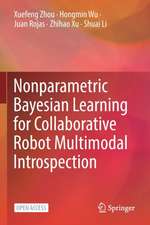Bond Graph Model-based Fault Diagnosis of Hybrid Systems
Autor Wolfgang Borutzkyen Limba Engleză Paperback – 10 sep 2016
| Toate formatele și edițiile | Preț | Express |
|---|---|---|
| Paperback (1) | 640.37 lei 6-8 săpt. | |
| Springer International Publishing – 10 sep 2016 | 640.37 lei 6-8 săpt. | |
| Hardback (1) | 646.62 lei 6-8 săpt. | |
| Springer International Publishing – 18 noi 2014 | 646.62 lei 6-8 săpt. |
Preț: 640.37 lei
Preț vechi: 753.39 lei
-15% Nou
Puncte Express: 961
Preț estimativ în valută:
122.53€ • 128.28$ • 101.39£
122.53€ • 128.28$ • 101.39£
Carte tipărită la comandă
Livrare economică 05-19 aprilie
Preluare comenzi: 021 569.72.76
Specificații
ISBN-13: 9783319352268
ISBN-10: 3319352261
Pagini: 292
Ilustrații: XV, 277 p. 172 illus., 98 illus. in color.
Dimensiuni: 155 x 235 x 16 mm
Greutate: 0.42 kg
Ediția:Softcover reprint of the original 1st ed. 2015
Editura: Springer International Publishing
Colecția Springer
Locul publicării:Cham, Switzerland
ISBN-10: 3319352261
Pagini: 292
Ilustrații: XV, 277 p. 172 illus., 98 illus. in color.
Dimensiuni: 155 x 235 x 16 mm
Greutate: 0.42 kg
Ediția:Softcover reprint of the original 1st ed. 2015
Editura: Springer International Publishing
Colecția Springer
Locul publicării:Cham, Switzerland
Cuprins
Introduction.- Bond Graph Representations of Hybrid System Models.- Structural Control Properties of Switched LTI Systems.- Bond Graph Model-based Quantitative FDI in Hybrid Systems.- Parameter Uncertainties.- Isolation of Multiple Parametric Faults from a Hybrid Model.- ARR based System Mode Identification.- Applications.- Failure Prognosis for Hybrid Systems Based on ARR Residuals.- Overall Conclusion and Discussion.
Notă biografică
Dr. Borutzky is a Professor of Modelling, Simulation and Visualisation of Engineering Systems at Bonn-Rhein-Sieg University of Applied Sciences.
Textul de pe ultima copertă
This book presents a bond graph model-based approach to fault diagnosis in mechatronic systems appropriately represented by a hybrid model. The book begins by giving a survey of the fundamentals of fault diagnosis and failure prognosis, then recalls state-of-art developments referring to latest publications, and goes on to discuss various bond graph representations of hybrid system models, equations formulation for switched systems, and simulation of their dynamic behavior.
The structured text:
• focuses on bond graph model-based fault detection and isolation in hybrid systems;
• addresses isolation of multiple parametric faults in hybrid systems;
• considers system mode identification;
• provides a number of elaborated case studies that consider fault scenarios for switched power electronic systems commonly used in a variety of applications; and
• indicates that bond graph modelling can also be used for failure prognosis.
In order to facilitate the understanding of fault diagnosis and the presented bond graph model-based approach to fault diagnosis in hybrid systems, three appendices cover the required notions, definitions, a short introduction into bond graph modelling, and some mathematical background.
Bond Graph Model-based Fault Diagnosis in Hybrid Systems may be used in courses on fault diagnosis, as a supplementary text for advanced courses in modelling, simulation, and control, as well as for self-studies and as a reference. It has been designed to serve readers in academia and in industry concerned with fault diagnosis who might be interested to see how a graphical methodology such as bond graph modelling can support quantitative model-based fault diagnosis of engineering systems represented by a hybrid model.
The structured text:
• focuses on bond graph model-based fault detection and isolation in hybrid systems;
• addresses isolation of multiple parametric faults in hybrid systems;
• considers system mode identification;
• provides a number of elaborated case studies that consider fault scenarios for switched power electronic systems commonly used in a variety of applications; and
• indicates that bond graph modelling can also be used for failure prognosis.
In order to facilitate the understanding of fault diagnosis and the presented bond graph model-based approach to fault diagnosis in hybrid systems, three appendices cover the required notions, definitions, a short introduction into bond graph modelling, and some mathematical background.
Bond Graph Model-based Fault Diagnosis in Hybrid Systems may be used in courses on fault diagnosis, as a supplementary text for advanced courses in modelling, simulation, and control, as well as for self-studies and as a reference. It has been designed to serve readers in academia and in industry concerned with fault diagnosis who might be interested to see how a graphical methodology such as bond graph modelling can support quantitative model-based fault diagnosis of engineering systems represented by a hybrid model.
Caracteristici
Examines how bond graph model-based fault detection in hybrid systems can be used in engineering Includes schematics and bond graph drawings along with the display of simulation runs Discusses how bond graph model-based fault detection is related to modeling, simulation, control and fault diagnosis of mechatronic systems Includes supplementary material: sn.pub/extras
